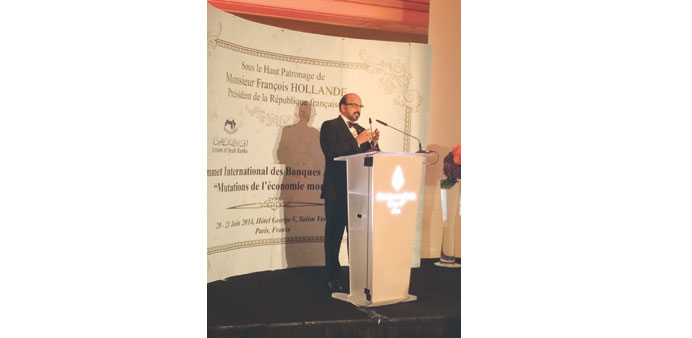Doha Bank Group CEO Dr R Seetharaman recently participated in a panel discussion at the International Arab Banking Summit 2014 in Paris, which was themed “Transitions in world economy”.
Seetharaman highlighted the major developments impacting global economy.
According to IMF’s April outlook, the global economy is expected to grow by 3.6% in 2014.
However, recently the International Monetary Fund slashed US growth to 2% from its April forecast of 2.8%, on account of harsh winter and struggling housing market. The global GDP at constant prices had grown by only 2.9% in 2013 however it had grown by 4.7% in 2005, before crisis and had contracted by 0.4% in 2009, immediately after the crisis. Similarly, the global trade had grown by only 2.1% in 2013. However, it had grown by 6.5% in 2005, before crisis and had contracted by 12.2% in 2009, immediately after the crisis. The above developments indicate that global economy is recovering too slowly and still has not returned to pre-crisis strength.
He said, “The scope of regulation should be expanded. It should remain flexible to keep up with innovation in financial markets and should focus on activities, not institutions. Initiatives should be undertaken to reduce rating agencies’ conflicts of interest and improve investor due diligence. “Greater transparency in the valuation of complex financial instruments is needed. Money market infrastructure should be improved. Monetary policy should respond to the buildup of systemic risk. Rules for cross-border financial sector resolution is required and a credible global liquidity framework is needed.”
Dr Seetharaman highlighted the importance of global governance to revive economy. He said, “G20 aims to lift global growth over the next five years by more than $2tn, creating tens of millions of new jobs across the globe. The plan is to get to a potential increase in G20 GDP of 2% or more.
“The financial services sector can also play a key role in the revival of global economy. G20 country growth strategies will contain a mix of macroeconomic and structural reforms at the domestic level that suit each country’s circumstances in areas with the greatest potential to lift global growth. It will be focused on increasing quality investment in infrastructure which will create jobs and boost economic growth, reduce barriers to trade, develop reforms to promote competition becoming more productive and innovative and lifting employment and participation.”
On various financial sector reforms after crisis, he said, “The Dodd–Frank Wall Street Reform and Consumer Protection Act in US implemented the regulatory reforms in response to the crisis. The Volcker’s Rule was enacted under this regulation to restrict proprietary trading. Basel 3 has come out with revised capital and liquidity coverage ratios.
“The revised capital requirements will enable banks to plan themselves for growth scenarios at the same time focus on financial safety, through capital buffers. In 2013 in relation to liquidity coverage ratio the regulatory reforms expanded the definition of high-quality assets to include certain assets such as residential mortgage-backed securities rated AA or higher, corporate debt securities rated A+ to BBB-, and unencumbered equities that meet certain conditions.

